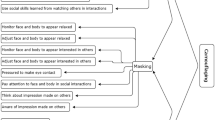Abstract
The Adjustment Scales for Sociometric Evaluation of Secondary-School Students (ASSESS) was designed to assess peer ratings of the behavior of male and female adolescents. Five scales were developed and crossvalidated: Aggression-Disruptiveness, Withdrawal, Anxiety, Social Competence, and Academic Difficulty. Evidence of adequate internal consistency and testretest reliability was presented. Evaluations by male and female classmates were highly correlated. Sex and age differences accounted for only a small proportion of the total variance.
Similar content being viewed by others
References
Bower, E. M.Early identification of emotionally handicapped children in school (2nd ed.). Springfield, Ilinois: Charles C Thomas, 1969 (Originally published, 1960).
Cowen, E. L., Pederson, A., Babigian, H., Izzo, L. D., & Trost, M. A. Long term follow-up of early detected vulnerable children.Journal of Consulting and Clinical Psychology, 1973,41, 438–446.
Jackson, D. N. A sequential strategy for personality scale construction. In C. D. Spielberger (Ed.),Current topics in clinical and community psychology (Vol. 2). New York: Academic Press, 1970. Pp. 61–96.
Minturn, M., & Lewis, M. Age differences in peer ratings of socially desirable and socially undesirable behavior.Psychology Reports, 1968,23, 783–791.
Müssen, P., Conger, J., & Kagan, J.Child development and personality. New York: Harper & Row, 1974.
Norman, W. T. Toward an adequate taxonomy of personlity attributes: Replicated factor structure in peer nomination personality ratings.Journal of Abnormal and Social Psychology, 1963,66, 574–583.
Pekarik, E. G., Prinz, R. J., Liebert, D. E., Weintraub, S., & Neale, J. M. The Pupil Evaluation Inventory: A sociometric technique for assessing children's social behavior.Journal of Abnormal Child Psychology, 1916,4, 83–97.
Prinz, R. J., & Kent, R. N. Recording parent-adolescent interactions without the use of frequency or interval-by-interval coding.Behavior Therapy, 1978,9, 602–604.
Roff, M. Some problems and strategies in life history research. In M. Roff & D. F. Ricks (Eds.),Life history studies in psychopathology. Minneapolis: University of Minnesota Press, 1969.
Roff, M., & Sells, S. B. Juvenile delinquency in relation to peer acceptance-rejection and socio-economic status.Psychology in the Schools, 1968,5, 3–18.
Rubenstein, R., Fisher, L., & Iker, H. Peer observation of student behavior in elementary school classrooms.Developmental Psychology, 1975,6, 867–868.
Sells, S. B., & Roff, M.Peer acceptance-rejection and personality development. Final report of a 5-year research program, including studies of the origins of acceptancerejection, effects on early delinquency and drop-out, and developmental dynamics. U.S. Office of Education, January 1967.
Smith, G. Usefulness of peer ratings of personality in educational research.Educational and Psychological Measurement, 1967,24, 967–984.
Walder, L. O., Abelson, R., Eron, L. D., Banta, T. J., & Laulicht, J. H. Development of a peer-rating measure of aggression.Psychological Reports, 1961,9, 497–556. (monograph supplement 4–49).
Wiggins, J. S.Personality and prediction: Principles of personality assessment. Reading, Massachusetts: Addison-Wesley, 1973.
Wiggins, J. S., & Winder, C. L. The peer nomination inventory: An empirically derived sociometric measure of adjustment in preadolescent boys.Psychological Reports, 1961,9, 643–677.
Winder, C. L., & Wiggins, J. S. Social reputation and behavior: A further validation of the Peer Nomination Inventory.Journal of Social Psychology, 1964,68, 681–684.
Author information
Authors and Affiliations
Additional information
This research was supported by Grant MH-21145 from the National Institute of Mental Health and funds from W. T. Grant Foundation. We wish to acknowledge the assistance of Ronda Brooks, Lina Jandorf, and Jean Sullivan in conducting the data collection, as well as the many school districts that have cooperated.
Rights and permissions
About this article
Cite this article
Prinz, R.J., Swan, G., Liebert, D. et al. ASSESS: Adjustment Scales for Sociometric Evaluation of Secondary-School Students. J Abnorm Child Psychol 6, 493–501 (1978). https://doi.org/10.1007/BF00926059
Revised:
Issue Date:
DOI: https://doi.org/10.1007/BF00926059




